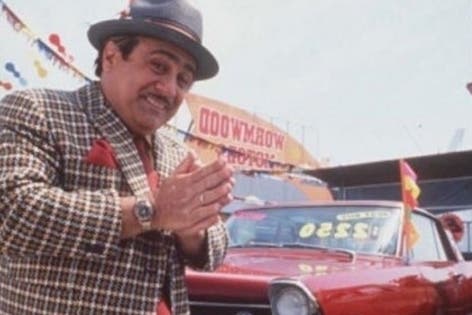Myth-busting the murky world of video game trade-ins
Plus five top tips that will make you a savvy shopper.
The business of second-hand video games - pre-owned, trade-ins, used games, whatever you want to call it - is mysterious. Shops make millions while developers and publishers shake their fists in rage. Or do they?
Ben Grant and Matt Precious are "magicians that have come out of the magic circle", they tell me. They ran GAME and Gamestation's colossal, thousand-store trade-in and pre-owned business for more than a decade. They know their stuff. Now they're ready to share it.
Not for nothing, mind you. They're plugging their new business, Trade In Detectives, at the same time. But it's worth a look. It's a website that compares trade-in game prices - the kind of index Precious used to employ someone full-time at GAME to produce, and even then he could only keep up with a top 20. "We scrape and obtain around 110,000 prices per day," says Grant. "I wish it existed when I was at bloody GAME!" adds Precious.
Grant continues: "People don't necessarily know the true value of what their games and consoles are worth."
This article aims to bust a few myths about the trade-in and pre-owned business while providing you with some savvy shopping tips at the same time. 'Tis the season after all.
Do publishers really hate trade-ins?
Publishers fund trade-ins. When Precious and Grant worked in Australia trying to improve GAME's standing, every single trade-in deal was funded by publishers. It's not trade-ins that publishers hate - it's the subsequent sale of pre-owned games.
"There was this myth about how much money was being dragged out and taken," says Precious, "but you've got to look at it two ways. When we talk about pre-owned we always split it. There's two sides to it: there's trade-ins and there's pre-owned.
"You'll find it difficult to find a publisher who has an issue with trade-ins, because trade-ins drive the market."
Non-trade-in customers would buy an average of 2.9 new games a year, recalls Precious, citing statistics collected from GAME Reward Card users. Trade-in customers, meanwhile, would buy an average of 6.4 new games every year.
"It was a phenomenal difference," he says. "It's not rocket science why, because they can afford it, because they were using their old games as currency to buy new."
Think of the world's best selling video game, Grand Theft Auto 5, the pair instruct me - do I think that would have sold anywhere near what it did had people not traded in their old games to afford it?
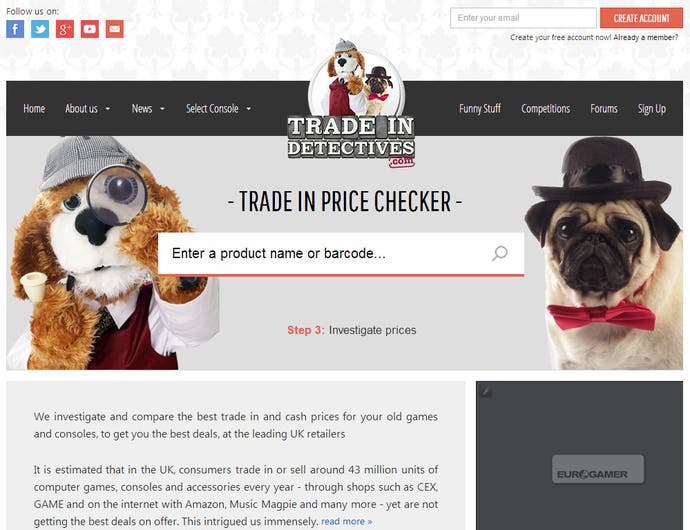
"In Australia," says Precious, "all our trade-in offers were funded by publishers. They paid for them. Every single one. Activision, EA, Nintendo, Sony, Microsoft - everyone paid for the trade-in offers, because we sat down and we discussed it and we told them what it did for their business."
You can see evidence of publishers funding trade-in deals around us now, the pair point out. Take the 'upgrade to next-gen for £10', or the '£40 trade-in value guaranteed' deals Amazon and GAME are offering on cross-generational titles FIFA 14, Battlefield 4 and Need for Speed: Rivals - and Call of Duty: Ghosts in GAME's case. They're effectively the same thing, and they encourage you to trade your PS3 and 360 version of a game for a cheap PS4 or Xbox One version instead.
But how do shops make any money from that? They'd have to sell that game they bought from you for more than £40 to make any profit. Who's going to buy a pre-owned PS3 or 360 game at that price? Ben Grant and Matt Precious have a good chuckle.
"[The EA games deals are] being funded by EA," says Grant, "because EA know that the trade-in model is going to stimulate the next-gen sales. And, interestingly, you can't trade-in FIFA for Call of Duty - you have to go with the same publisher. Both EA and Activision are actively out there right now funding trade-in offers at GAME and Amazon. They're also doing it in America with GameStop."
"It's not cloak and dagger," he adds. "It's not a mystery - it's a commercial deal that isn't in the public eye. But it's a good deal for gamers.
"Nintendo, two or three years ago, were funding hardware trade-in offers with GAME on TV. Publishers fund trade-in offers; they understand trade-ins and they're trying to use it to their advantage, and quite rightly so."
Activision and EA declined to comment on the matter when I contacted them and Nintendo hasn't replied at all. However, one source - a UK publishing veteran with 20 years' experience - tells us he isn't familiar with the practice. "Certainly we've never been in that kind of situation," he says, wishing to remain anonymous. "We've never come across that, or it's never been part of a negotiation." But it makes sense, he hastens to add.
Andy Payne, another veteran of the British gaming industry and boss of budget publishing house Mastertronic, isn't aware of publishers funding trade-in deals either, although again, he's "slightly suspicious" about some offers he's seen. "To see Medal of Honor be offered as a trade in against Call of Duty certainly made you think, is the retailer doing this or is the publisher helping in order to drive market share?"
"Overall," he adds, "if the opportunity to play a game to the end and then trade it in generates more sales activity, then that is probably a good thing."
"It's not viewed as a bad thing," my anonymous veteran agrees.
Publishers actually hate sales of pre-owned games
When you trade in a game, you create a pre-owned/second-hand/used game that the shop can sell on. The two - trade-ins and pre-owned - are inseparable. And while trade-ins enable us all to afford new games, reselling those games enables shops to afford to go on.
"Without pre-owned there wouldn't be a specialist retailer," says Matt Precious. "GAME wouldn't exist, HMV, GameStop - GameStop wouldn't exist. You've got to look around and wonder what the gaming industry on the high street or online would look like without a specialist. I go into my local supermarket and look at DVDs and CDs and it's soulless. It's a top 10 chart that Beryl's put together. We would have a very soulless industry.
"Pre-owned allows retailers to live, to survive."
(I painted a picture of what a world would be like without specialist retailers like GAME when the chain nearly collapsed early last year.)
A few years ago, pre-owned sales delivered a third of all the money GAME made, they tell me - some £400 million from pre-owned in only a year. 43 million games were traded in through UK shops on the high street and online last year, generating something like £800 million, they reckon. That's more than a third of the £2.2 billion new-game market in the UK. "That's how big it is," says Grant.
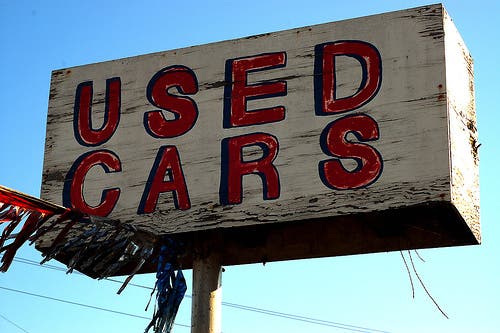
What makes it such a golden goose is that VAT (value added tax) works differently on second-hand games. A shop is only taxed on the profit made from selling a second-hand game, whereas VAT applies to the full amount of a first-hand game.
It's a model that's been around for 20 years, reckon Precious and Grant, and they remember it arriving from America with Jon Steinbecker, boss of Electronics Boutique, the company that bought GAME in 1999.
"The biggest challenge I faced back then was educating the store staff to tell consumers," recalls Grant. "Consumers didn't know they could trade in their old games, or they knew very little, and store staff certainly weren't promoting it, and they weren't very aware of how beneficial it was, so we went on a massive offensive to make sure that every single phone call, every single customer was told, 'Remember: you can trade-in your old games to save money.'
"It wasn't us necessarily trying to ram it down customer's throats; it's good customer service."
Things really hit the roof when, eight years ago, Precious and Grant spearheaded the most successful trade-in campaign in GAME's history: the 99p deal. You could trade in any four games to get any new game for only 99p. Think of the really old games lingering in your collection: they'd fetch a pittance traded today, but in the 99p deal it wouldn't matter.
The deal blew up, and second-hand stock flooded in. Anyone within the company who wasn't convinced was now. "We ran it in other countries, in other territories, around the world as well," recalls Precious. "I'd like to say that's the most successful pre-owned campaign that's ever been run."
Incidentally, the duo tried offering the new game for nothing, not 99p, but people didn't trust it. "Free just sounded too good," says Precious, and it wasn't as successful.
GAME and Gamestation were flying high, raking it in. Stores competed for prizes such as flying to the annual video games Mecca in Los Angeles, E3, and everything was on the up. But publishers were struggling, and it looked an awful lot like shops were getting rich at their expense.
"We were making a lot of money out of second-hand games and publishers were struggling," says Grant. "Publishers are three-to-four years ahead of where retailers are, because they're having to invest three-to-four years early to develop games before we actually see it hit the shelves. So when a publisher starts struggling and a retailer is doing well, there are going to be some conversations around who's making the most money and why."
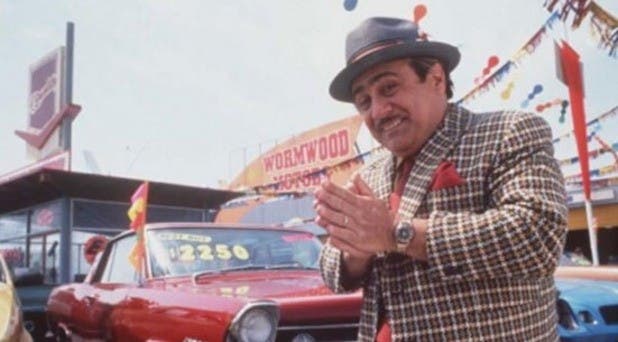
"It was a little bit cloak and dagger then," adds Precious. "No one talked about pre-owned or trade-ins and no one would discuss how much money [was being made]."
"That was part of the problem," picks up Grant. "Publishers would say, 'How much money is being made? How many trade-ins?' And it was something [like], 'It's none of your business.' So they assumed and exaggerated."
"When it all first started," my anonymous veteran remembers, "and we saw how much revenue stores were getting from it, it was, 'Oh my god! We're not getting any of that.' It's become more accepted because it's been a tough couple of years across the market, and personally, if retail hadn't got that moving, there wouldn't be retail, and we wouldn't have stores to sell the next generation in."
According to Grant and Precious, EA hired an external consultancy firm to investigate, and was told it had two choices: spend a lot of money fighting pre-owned "and you'll never win", says Grant, or embrace pre-owned sales "and use it to your effect". The latter was recommended. But other publishers were still angry.
"I once had a much smaller publisher come in and they were effing and blinding and slamming fists about it. 'You say all this! Pre-owned has destroyed my business! My titles haven't sold because of your pre-owned model!'" remembers Precious.
He got the books - GAME's accounts - out.
"'Well your games didn't sell,' I said. 'If they didn't sell then I didn't trade any in, and if I didn't trade any in, it means I've got none in pre-owned, so how the frigging hell is my pre-owned model killing your game?' I said, 'Let's just sit down and be honest here. Is it the pre-owned model that killed them, or is it that your games weren't very good?'
"Pre-owned games can't kill small publishers because it can't cannibalise something if it's not big in the first place. You have to sell a lot for a lot to be traded in to do any damage, to affect or cannibalise any of your sales. That's the point. Sometimes it's used as a bit of an excuse internally - 'ah it's because of pre-owned'. No, maybe it just wasn't a very good game."
Few games will ever sell more copies than Grand Theft Auto 5, but pre-owned sales of it will be fewer in a year than Rockstar managed in an hour at launch, Precious predicts. And those amazing launch figures couldn't have happened, he maintains, without trade-ins. "Your average pre-owned sales on that title in a year will not add up to what it will sell in the first weekend, nowhere near. And that's across the board in triple-A releases."
"The good of trade-ins outweighs the bad of pre-owned," he says.
Can you make more money selling games on eBay?
It's debatable whether you can make more money selling games on eBay. What's more, Grant and Precious argue that non-specialist online marketplaces like eBay are the biggest current threat to the gaming industry.
Something like 64,000 gaming-related bits and bobs - games, consoles and accessories - sell on eBay each week, the pair tell me. Do a bit of crude maths and multiply that by the 52 weeks in a year and - Grant calculates quickly - "you're talking nearly 19 million units sold on an annual basis through eBay".
The issue, he explains, is "that money is leaving the industry". When you trade in a game at a specialist retailer like GAME, an entertainment retailer like HMV or even a supermarket, the chances are you'll opt for store credit and spend it again on a similar kind of content. But on eBay there's no such thing - no credit. It's just money - money that can be used for bills or nappies or cat food or beer. "That's the biggest threat," stresses Grant, and publishers are only now starting to realise that.
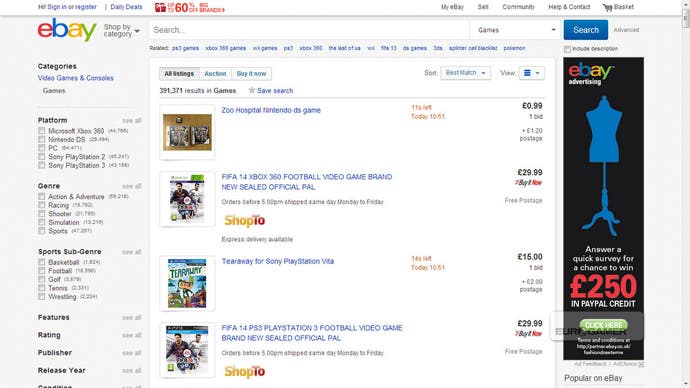
"People like eBay and Music Magpie are coming in, they're taking the crop but they're not laying any seeds down..."
Matt Precious
"It's like a farmer's field," says Precious. "He lays the seed down, his crop comes, everyone's great, everyone chops away the crop and has their share. But what the specialist retailers are doing when they take away that crop is they're laying those seeds down again, because you traded in your games to buy new games, for the next harvest.
"But what's happening is, people like eBay and Music Magpie are coming in, they're taking the crop but they're not laying any seeds down, so they're just literally making money from second-hand games and putting nothing back into the industry, into the ground, that allows then for growth next year for the next crop. That's when your field gets bare, that's when the industry suffers and titles fail."
"But," he adds, "if eBay are going to offer you twice as much as the person down the road, then that person down the road needs to step up." It's in publishers' and retailers' mutual best interests, then, to work together and keep the business where it benefits the industry most.
"I'm sure they would like it to be concentrated on their stores!" my anonymous veteran clucks. "If they were really serious about working with publishers, they would be giving an X per cent cut. 'Support us with our trade-in campaigns and we'll do an Apple or whatever, and you'll get a 30 per cent - or we'll take the 30 per cent and you take the rest.'
"As far as I'm aware, those conversations have never taken place. And until that conversation happens..."
Andy Payne takes a more pragmatic stance. "If [eBay et al] offer a service to gamers and it works for both parties then they will have their place in the ecosystem. ... Ultimately that is capitalism in action. It is a free market after all.
"But specialist retailers, publishers/developers and platform holders should work closely together and should look to collaborate far more than they currently do. A simple revenue-share against trade-ins would be hugely welcomed by the game makers in these straightened times. It has not happened before but it could happen, especially as the market is polarising fast. Choices need to be made."
But are you really getting twice as much cash for your game on eBay anyway? "What people don't factor in is, yes, perhaps a lot of the time you will get a higher price for selling it privately, but eBay charge you a listing fee," says Grant. "They then charge you a 10-per-cent-of-your-final-sale price; you then have to pay a 3.4 per cent PayPal fee plus 20 pence. On top of that you've got to post the item, pay for packaging...
"But most importantly, which people don't factor in, is your own time. I would suggest that listing, answering customers' queries, picking, packing and sending it - we're probably looking at an hour of your time. And, what, the minimum wage is something like £6?
"By the time you've added up all that... People go, 'Ah wow! I got £20 on eBay.' Well, no you didn't: you probably got £14."
The under-appreciated side effect of new consoles
PlayStation 4 and Xbox One will give PlayStation 3 and Xbox 360 a lease of new life, because more than two thirds of people will trade their old consoles in order to afford a new one, Precious suggests. And the price of PS3s and Xbox 360s comes down a notch as a result. "It expands the market. It opens it up, makes it affordable for a raft of people that just couldn't afford to get into the market before."
Just look at the PS2, Grant says. "Pre-owned was a major catalyst in that."
"Microsoft's principle was correct, but how they were going to execute it hadn't been thought through."
Ben Grant
This benefits the wider industry as well as shops. Precious says that 88 per cent of things - games, peripherals - packed in with a used console were new when he was at GAME. "Yes the pre-owned console went out there, but it was new games and peripherals and accessories that people were purchasing with them.
"When the 3DS came out at GAME," he recalls, "80 per cent traded in an NDS to buy the 3DS. We did some research with Nintendo, and their sales of games for the NDS went through the roof because suddenly people could pick up an NDS for £50. It just went phenomenal, and everyone made money out of it. That's the way to look at it. It goes back to the old field: it's putting something back in the soil that allows the industry to grow."
(Do note again that Nintendo didn't reply and therefore I couldn't verify this.)
Why did Microsoft try to 'fix' it, then?
No one's answered the biggest question facing the industry right now, which is how to translate that decades-old second-hand sales model into the online world. Sites such as Green Man Gaming are trying, but until it works on a massive scale - until it works on Steam, in other words - it remains marginalised.
Microsoft unveiled a vision for Xbox One that involved digital game licences tied to a database rather than discs, which shops would pay publishers to be able resell. But it went down like a lead balloon. Matt Precious and Ben Grant don't think it was a bad idea: it was just badly communicated. "There's an understatement!" blurts Precious. "It's up there with new Coke!"
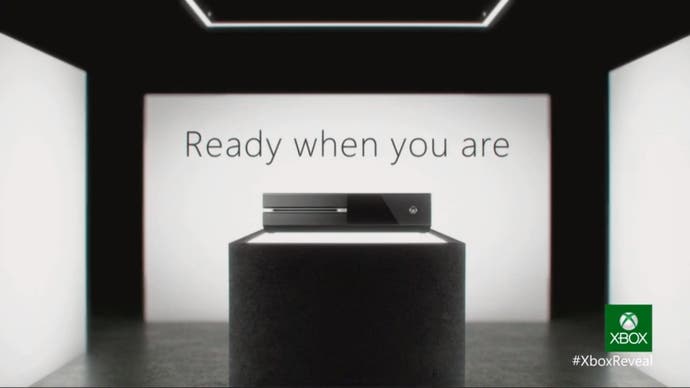
Blocking or controlling trade-ins isn't something Microsoft invented: there was talk of Sega trying it with the Mega Drive all those years ago. Did Sony ever consider something like that for its platforms? It's impossible to say, although Grant and Precious suspect it's been discussed. "It's been going on for years," nods Grant, "and never materialised because there isn't a system in place that's a) fair and b) sustainable.
"Microsoft's principle was correct, but how they were going to execute it hadn't been thought through. All the permutations... There were all these situations that they hadn't thought through that made it a complete and utter blunder."
As it stands, there's no way of trading in what you buy and download from the Xbox Games Store or the PlayStation Store. You pay either the same or more than you do in a shop, and what you buy has no resale value. There's an obvious next step, and online trade-ins are a lot more likely than price cuts, but it's a minefield that Microsoft and Sony are right to be wary about entering.
Until such a time as one of the platform holders makes their move, though, boxed game trade-ins remain as important as ever.
